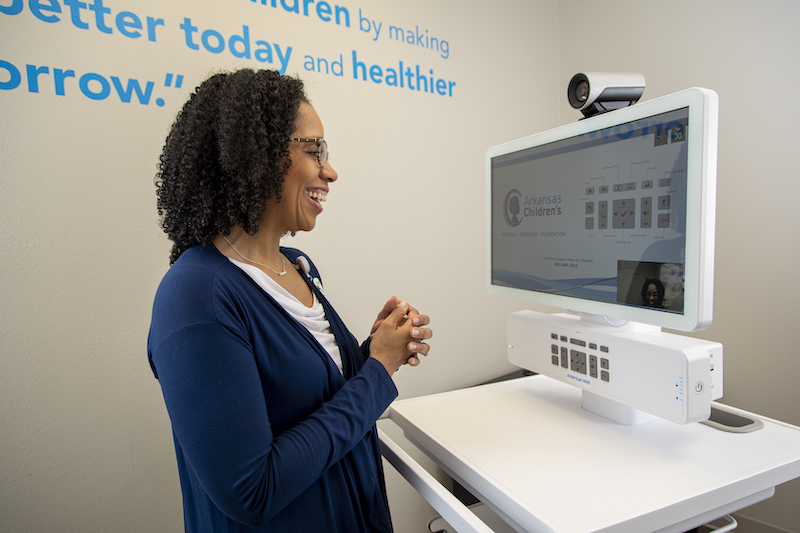COVID-19 Guide: Telemedicine Tips

As social distancing recommendations continue, Arkansas Children’s Hospital and many private practices across the state are offering telemedicine appointments to patients. Dr. Tamara Perry, medical director of Telehealth for Arkansas Children's, and Dr. Natalie Burr, a pediatrician at Little Rock Pediatric Clinic, both answered our questions about virtual pediatric visits. We hope this information will help parents successfully prepare for and know what to expect during their child’s remote care.
Telemedicine Q&A
LRF: First things first, what is telemedicine?
Dr. Perry: Telemedicine is the use of technology-enabled communication devices to deliver remote medical care. This can include the use of live, interactive video, recorded video and/or telephone communication. Parents may also hear this referred to as telehealth.
LRF: How is preparing for your child’s telemedicine appointment different than an in-office visit?
Dr. Burr offered a helpful checklist specific to virtual visits:
-
Download, open and explore the app or telehealth website before the visit begins. Dr. Perry also recommends ensuring you’ve received any pre-visit information through the telemedicine app or portal.
-
Check that the camera and microphone on your phone or computer are working and can be accessed by the app or website (you usually have to give permission).
-
Make sure that you have the best internet connection possible, and try to use the internet browser (Chrome, Firefox, etc.) that is recommended by the telehealth app or website.
-
Move to a well-lit area in the home. Try to have the light in front of you and not behind you. It might also be useful to have a flashlight handy to shine light on a rash or in a throat.
-
Dr. Perry adds that your space should also be quiet and distraction free if at all possible.
Pro tips for any visit: Whether in the office or in a telehealth visit, it is always helpful to have a list of current medications, medical conditions and some details about the current problem (timing, severity, medications tried). “Parents should also prepare by writing down any questions they may have, so they don’t forget them,” Dr. Perry adds.
LRF: Should the patient be present for the virtual visit?
Dr. Perry says yes. “The patient should be present for the visit. This will allow the provider to conduct a physical assessment of the child and/or allow the child to answer questions from the provider. For older children, the provider may want to talk directly to the patient.”
“Wait until the visit begins to try to get your child on camera, recommends Dr. Burr. “As with in-office visits, there may be a wait and children can become frustrated if they have to sit still in front of a phone or computer and wait for the visit to begin.” If your child is restless, make sure to have quiet activities on-hand.
LRF: What can parents do during a telemedicine appointment to help their doctor?
Dr. Perry offers her three top tips:
-
Be early. Logging in before your appointment is set to begin ensures you’ll be ready when the doctor logs on.
-
Avoid noise or distractions. “Excessive background noise and interruptions will make it difficult to get all of the information to the doctor and you may miss something important.”
-
Do not multitask. “Completing other tasks during a telehealth visit is really distracting and should be avoided.”
LRF: What are examples of issues that work well with telemedicine?
Dr. Perry: Management of many acute and chronic illnesses can be conducted by telehealth. Most of the needed information can be gathered with a good history from the parent especially if the visit is conducted with good audio and video components.
LRF: What types of appointments do not work well via telemedicine?
Dr. Burr: Some visits are still best to do in the office. Well-child visits that require immunizations are a good example. Other problems that will usually need to be seen in the office include infants with fever, concern for ear infection in children under two years of age, wheezing or difficulty controlling asthma symptoms and most injuries.
The schedulers and nurses at your pediatrician's office should be able to help you decide whether a telehealth visit is appropriate for your child's complaint. Sometimes a telehealth visit may need to be converted to an in-office visit if the doctor feels like they need a more detailed examination or some additional investigation, such as lab or x-rays.
In addition to her telehealth role at Arkansas Children’s, Dr. Tamara Perry is also chief of Pediatric Allergy and Immunology and an associate professor of Pediatrics at UAMS.

